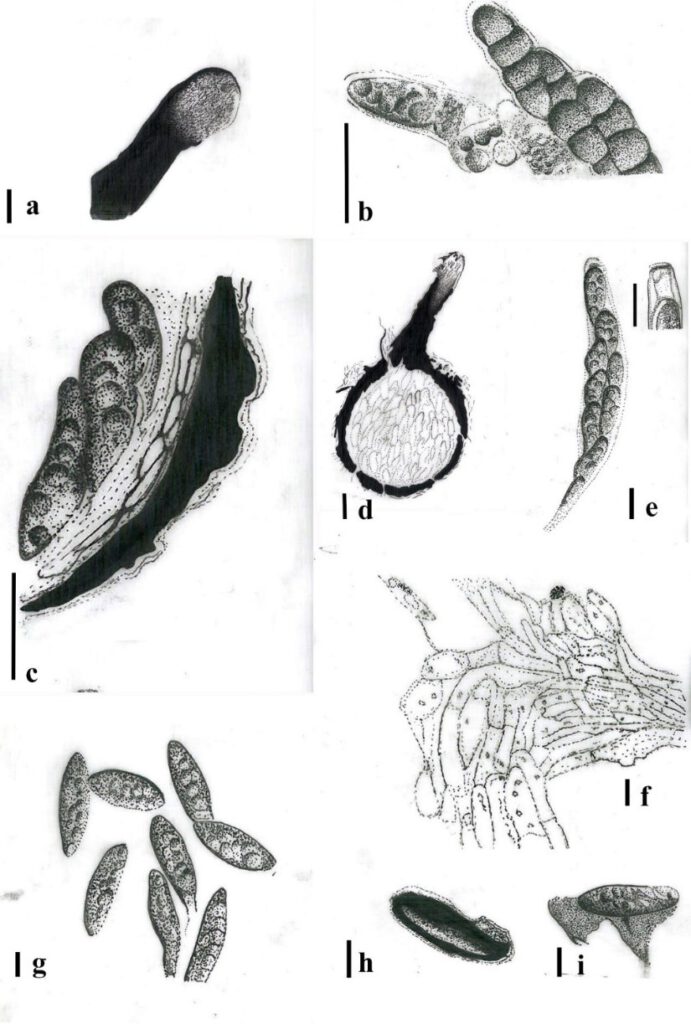Fungalpedia – Note 53 Hanliniomyces
Hanliniomyces Raja & Shearer
Citation if using this entry Noorabadi MT et al. (2023) New genera in 2008-2009. Mycosphere (in prep)
Index Fungorum, Facesoffungi, MycoBank, GenBank, freshwaterfungi.org, Fig. 1
Based on unique morphological characteristics, the monotypic genus Hanliniomyces was introduced by Raja & Shearer (2008), within an uncertain position in Sordariomycetes, Ascomycota, with Hanliniomyces hyaloapicalis Raja & Shearer as the type species. This species was found growing on submerged partially decorticated woody debris in Florida. The asexual morph of this genus is unknown )Raja & Sheare 2008 ).
Type species: Hanliniomyces hyaloapicalis Raja & Shearer
Fig. 1 – Hanliniomyces hyaloapicalis. (redrawn from Raja & shearer. 2008) a Neck showing hyaline apex. c Peridium. d Longitudinal section through ascoma. f Paraphyses. e Ascus apical ring. g Discharged multiguttulate ascospores. B, h, i Ascospores stained in aqueous nigrosine showing gelatinous sheath and old 3-septate ascospores. Scale bars: a=500 μm, b-i=20 μm
Hanliniomyces is characterized by scattered ascomata, partially immersed to superficial, black, ostiolate, cylindrical, periphysate necks. The venter is globose to subglobose. peridium is membranous, consisting of pseudoparenchymal cells. Paraphyses are wide at the base, tapering towards the apex. Asci are unitunicate, narrowly fusoid, with or without a stalk, containing eight uniseriate to overlapping biseriate ascospores. Ascospores are ellipsoidal, aseptate and hyaline when young, becoming 3-septate and brown with age, surrounded by a gelatinous sheath) Raja & Shearer 2008). Xylomelasma Réblová ́ and Lentomitella Höhn are morphologically similar to Hanliniomyces. However, Hanliniomyces can be distinguished from Lentomitella by having a black ascoma neck with a hyaline apex instead of a completely black neck and narrow fusiform asci instead of cylindric clavate asci. Unlike Hanliniomyces, the ascospores of Lentomitella are longitudinally striate, aseptate or septate and do not have a gelatinous sheath and are hyaline at maturity. Hanliniomyces differs from Xylomelasma in having necks with a hyaline apex. Xylomelasma has a cylindrical ascus with a short stalk. In addition, an ascospore sheath does not occur in Xylomelasma (Raja & Shearer 2008). This genus has no molecular data and is monotypic.
Reference
Raja HA, Shearer CA. 2008 – Freshwater ascomycetes, new and noteworthy species from aquatic habitats in Florida. Mycologia 100(3), 467–489. http://dx.doi.org/10.3852/07-167R.
Entry by
Maryam Tavakol Noorabadi, Center of Excellence in Fungal Research, Mae Fah Luang University, Chiang Rai 57100, Thailand.
(Edited by Kevin D. Hyde)
Published online 4 September 2023
